Stay Informed
Popular Articles
- Hiatal Hernia: Hidden Cause of Chronic Illness
- Small Intestinal Bacterial Overgrowth (SIBO)
- Applied Lymphology: Unlocking the Secret to Pain Relief
- An Introduction to Constitutional Iridology
- The Low Down on Liver Detoxification
- An Energetic and Emotional Approach to Cancer
- Fat Facts
- Marrow in the Bones
- Blood Type and Nutrition
- Cardiac Herbs: Beyond Hawthorn
Quick Search
The School of Modern Herbal Medicine




Natural Approaches to Autoimmune Disorders
- 5/11/2015
- Categorized in: Specific Health Problems
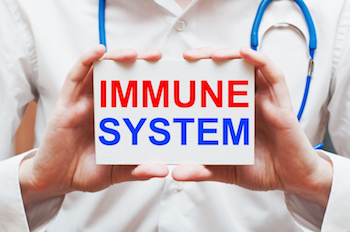 The human immune system is a marvel. Most of the time it does a wonderful job of protecting us from infections, toxins and abnormal cells of all kinds. Although it’s not a perfect analogy, we can think of the immune system as the body’s military forces. Certain white blood cells are always on hand to find and destroy foreign agents called antigens, then tag them so other white blood cells can destroy them.
The human immune system is a marvel. Most of the time it does a wonderful job of protecting us from infections, toxins and abnormal cells of all kinds. Although it’s not a perfect analogy, we can think of the immune system as the body’s military forces. Certain white blood cells are always on hand to find and destroy foreign agents called antigens, then tag them so other white blood cells can destroy them.
To do this, the body must be able to tell the difference between what is part of itself and what is foreign. In other words, it identifies what is self and what is non-self. Sometimes, the immune system fails to do this and misfires, attacking parts of the body. It’s like the “friendly fire” in a combat zone; it doesn’t matter whether the bullets are coming from the enemy or your own forces, they can still kill you. So, if the immune system gets confused about who the enemy is, it is going to cause problems.
When the immune system becomes confused about what is self and what is non-self, it starts tagging the body’s own tissues and proteins as if they were foreign invaders. This causes the immune system to attack and damage the body’s own tissues. Medicine has dubbed the diseases where this happens as autoimmune disorders.
Autoimmune disorders are growing more and more prevalent in our society. The actual cause of these health problems has not been firmly established by science, but we do know some probable factors contributing to their development.
Autoimmune Diseases
There are many autoimmune diseases, but they fall into two broad categories. There are conditions where the immune system confusion is confined to a specific organ or tissue and there are conditions that are systemic in nature, meaning the immune system is attacking tissues throughout the body. Hashimoto’s thyroiditis, Grave’s disease, myasthenia gravis, glomerulonephritis, primary biliary cirrhosis, Crohn’s disease, ulcerative colitis, MS, vitiligo, autoimmune hepatitis, and autoimmune adrenal disease are examples of organ-specific autoimmune diseases. Systemic disorders include Sjögren’s syndrome, scleroderma, rheumatoid arthritis (RA), progressive systemic sclerosis (PSS), polyarteritis nodosa (PAN), polymyositis, and relapsing polychondritis. Here’s a longer description of some of the major autoimmune disorders.
Multiple sclerosis (MS)
This condition is caused by the immune system attacking the central nervous system, particularly the myelin sheath that surrounds and insulates nerve fibers. This causes nerve impulses to “short circuit” causing muscle weakness, difficulty moving, balance problems, speech problems, fatigue, visual problems and chronic pain. MS generally occurs episodically, with worsening conditions and symptoms in each relapse.
Amyotrophic Lateral Sclerosis (ALS)
This condition is also known as Lou Gehrig’s disease. It is similar to MS in that the immune system attacks the nerve cells in the brain and spinal cord that control voluntary muscles. This results in degenerating nerves and muscles and eventually causes paralysis and death. Iron in the tissues increases oxidative stress in ALS.
 Rheumatoid Arthritis
Rheumatoid Arthritis
This is a form of arthritis in which the immune system attacks the joints, causing pain, swelling and stiffness. Deformities in the joints occur over time and the disorder may affect the heart, lungs and eyes.
Systemic Lupus Eyrthematosus
More commonly known simply as lupus, this condition is characterized by the immune system attacking the connective tissues of the body. The main symptoms include joint pain, swelling and redness, rashes on the nose and feet, chest pain and coughing, sunlight sensitivity combined with rash and fever, fatigue, and pain with inflammation.
Hashimoto’s Thyroiditis
This condition involves an immune attack on the thyroid gland and is believed to be the most common cause of underactive thyroid.
What Causes Autoimmune Reactions?
So, what causes the confusion in the immune system? Medical science has proposed several theories. One theory is that chronic, low-grade viral and bacterial infections stimulate an excessive immune response, resulting in a deregulation of the immune system. This may be a factor in autoimmune disease like rheumatoid arthritis, lupus and Crohn’s.
Another theory suggests that foreign substances (antigens), such as gluten from certain grains, are being absorbed into the body and triggering immune reactions. Because these proteins are similar to proteins found naturally in the body, the immune system winds up waging war on both. This is called molecular mimicry. Intestinal dysbiosis and leaky gut syndrome may be at the root of this problem, as the gastrointestinal (GI) tract issues are what allows these substances to be absorbed. 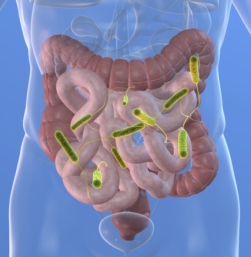 A third theory, called the hygiene hypothesis, suggests that the cause of people’s dysbiosis and intestinal problems lies in our over-sterilized living environments. This is a known factor in the increase in the development of allergies, which are another form of immune system deregulation where the immune system is overreacting to harmless external influences.
A third theory, called the hygiene hypothesis, suggests that the cause of people’s dysbiosis and intestinal problems lies in our over-sterilized living environments. This is a known factor in the increase in the development of allergies, which are another form of immune system deregulation where the immune system is overreacting to harmless external influences.
The reason this is a factor is because the friendly microbes that live in our GI tract are part of our immune system and contribute to its regulation. In order to create a healthy gut microflora we need to be exposed to dirt and the microbes it contains in early childhood, so the immune system can figure out what is a real threat and what is not. Because of this, children growing up on farms have healthier immune systems and fewer incidences of allergies and asthma than kids who grow up in sterilized home environments. So, this may also be a factor in autoimmune disorders.
All of these theories are somewhat interconnected and it is probable that autoimmune disorders have more than one cause. What this means to the person suffering from an autoimmune disorder is that there is never going to be a “magic pill” or specific “cure” that is going to fix an autoimmune condition. There may be very effective symptom-relieving drugs, but to actually restore normal immune functions one has to approach the problem from multiple directions.
So, in this article we’ll explore some holistic strategies for healing autoimmune diseases that are based on correcting these potential underlying causes. These suggestions include diet and lifestyle changes, herbs and nutritional supplements that many people have found effective in overcoming autoimmune conditions.
Strategies for Autoimmune Diseases
What follows are five basic therapies that can be helpful for all autoimmune disorders. These therapies are a good place to start the healing journey. There may also be therapies for specific autoimmune diseases that you can employee in addition to these core therapies, but you’ll have to explore those by working closely with your herbalist, naturopath or natural healer.
1. Eliminate Environmental Toxins
There are those who believe that the dramatic rise in autoimmune disorders is linked to environmental influences that are damaging our health. Both vaccinations and environmental toxins may be factors. Vaccinations: To understand why the increased use of vaccines may be a factor in autoimmune diseases, one needs to understand the difference between innate and acquired immunity. The innate immune system is found primarily in our intestines, but also in our skin and other mucus membranes. It not only acts as the first line of defense in protecting the body against infection, it is also involved in regulating the second line of immune defense, the acquired immune system.
Vaccinations: To understand why the increased use of vaccines may be a factor in autoimmune diseases, one needs to understand the difference between innate and acquired immunity. The innate immune system is found primarily in our intestines, but also in our skin and other mucus membranes. It not only acts as the first line of defense in protecting the body against infection, it is also involved in regulating the second line of immune defense, the acquired immune system.
Injectable immunizations bypass the body’s first line of immune defense and attempt to directly stimulate the second line of immune defense to mount a response. It is possible that this creates some of the immune system confusion. It is also possible that some of the viral material in the vaccine may become intertwined with the body’s own DNA, causing the immune system to view cells infected with this viral DNA from vaccines as defective.  Exposure to Chemicals: Another potential environmental trigger for autoimmune diseases may be the ever increasing number of chemicals we are exposed to from air pollution, water pollution, household cleaning supplies, food additives, agricultural chemicals and so forth. It is well known that many of these chemicals disrupt communications in the glandular system. Is it possible that they could also be disrupting communication in the immune system?
Exposure to Chemicals: Another potential environmental trigger for autoimmune diseases may be the ever increasing number of chemicals we are exposed to from air pollution, water pollution, household cleaning supplies, food additives, agricultural chemicals and so forth. It is well known that many of these chemicals disrupt communications in the glandular system. Is it possible that they could also be disrupting communication in the immune system?
For example, one of these toxins, mercury, has been implicated as a potential cause of multiple sclerosis. Mercury adversely affects immune function and attacks nerve tissues. People are exposed to it from many sources, including flu shot and “silver” fillings. Some people who have been diagnosed with MS have experienced great improvement after removing all the mercury-laden “silver” fillings from their mouths and doing a heavy metal cleanse.
The bottom line is that anyone who has an autoimmune disorder should do their best to minimize their exposure to toxins of all kinds. Switching to natural household cleaning products and eating organic foods are good places to start. They should also do some gentle cleansing to help remove toxins from their body. The cleansing must be gradual and gentle as strong cleansing programs may exacerbate symptoms in autoimmune diseases. The best herbs to use for detoxification in these cases are alteratives, like red clover and burdock.
Lymphatic Drainage Formula is an example of a gentle alterative formula. Put 1/2 teaspoon in a quart of water and sip a little bit throughout the day. Small doses of All Cell Detox (1-2 capsules per day) would be another option. As the body becomes stronger, Heavy Metal Detox (or the equivalent) and algin may be helpful for clearing heavy metals and other toxins from the body. The key is to start slowly, drink plenty of water and discontinue any cleansing herbs if symptoms get worse.
2. Heal the Gastrointestinal Tract
Healing the GI tract is a critical, basic therapy for anyone with autoimmune conditions. There are four parts to healing the GI tract.
Supplement Digestive Enzymes
First, use digestive enzymes and/or hydrochloric acid supplements to improve digestive function. Most people with autoimmune disorders benefit greatly from digestive enzyme supplements, which they may require in fairly high doses (2-4 per meal). They may also benefit from hydrochloric acid supplements if they have problems digesting protein.
Remove Harmful Microbes
 As mentioned earlier, chronic low-grade viral and bacterial infections have been implicated in causing immune deregulation. So, step two is to use supplements to help remove these infectious organisms from the body. In treating these infections one should follow the same advice as for cleansing. Start with a low dose to make sure the supplement is tolerated; then gradually work up to a larger dose.
As mentioned earlier, chronic low-grade viral and bacterial infections have been implicated in causing immune deregulation. So, step two is to use supplements to help remove these infectious organisms from the body. In treating these infections one should follow the same advice as for cleansing. Start with a low dose to make sure the supplement is tolerated; then gradually work up to a larger dose.
A good supplement for reducing both yeast and bacterial overgrowth in the intestines is Yeast/Fungal Detox. Another good choice is herbs contain berberine such as goldenseal. You can also get berberine as a supplement. The Candida Clear program is a good microbial cleansing program that may also be helpful.
In addition to removing harmful microbes from the GI tract, it is also important to address any type of chronic infection such as Epstein-Barr Virus, gingivitis, sinusitis or urinary tract infections. For low grade viral infections VS-C is a good formula. Another option for treating these low grade infections is Silver Shield.
Heal the Gut
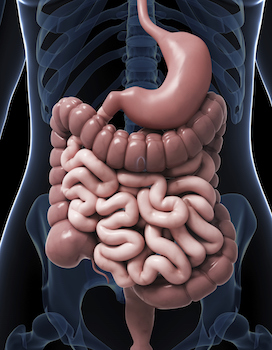 As previously suggested, leaky gut syndrome may be a contributing factor in most, if not all, autoimmune conditions. In leaky gut, the gaps between the intestinal cells widen, which allows substances to be absorbed into the blood and lymph that should not be absorbed. The body sees these substances as foreign invaders and starts creating antibodies to tag them for destruction. Unfortunately, due to molecular mimicry, this may result in the immune system targeting some of the body’s own tissues.
As previously suggested, leaky gut syndrome may be a contributing factor in most, if not all, autoimmune conditions. In leaky gut, the gaps between the intestinal cells widen, which allows substances to be absorbed into the blood and lymph that should not be absorbed. The body sees these substances as foreign invaders and starts creating antibodies to tag them for destruction. Unfortunately, due to molecular mimicry, this may result in the immune system targeting some of the body’s own tissues.
So, it is wise for people with autoimmune issues to eliminate all potential allergy-causing foods. These include all grains with gluten (wheat, rye, barley) and all dairy products, which contain casein. These are two of the biggest offenders. They may also have to eliminate other common allergens, including tree nuts, peanuts, soy and citrus. A diet comprised primarily of fresh vegetables, especially leafy green vegetables, high quality proteins and some fresh fruit is a good starting point, but a person may need to experiment a little to find out what foods make their symptoms worse to eliminate them.
Besides adjusting the diet, it’s also important to take supplements to help repair the intestinal membranes and help to tighten the gaps between the cells. One of the best supplements for this is black walnut. Another possibility is Una de Gato.
Replace Friendly Flora
 Both the initial development and the ongoing maintenance of the immune system is highly dependent on the microflora in the intestines. These friendly bacteria are part of the complex feedback loops that regulate how the immune system responds to threats. The establishment of a healthy gut microflora starts with vaginal delivery and is continued via breast milk and skin to skin contact with mother. Later, exposure to normal levels of “dirt” and “germs” as a child would experience growing up on a farm, further develop this gut microflora and help to regulate the immune responses.
Both the initial development and the ongoing maintenance of the immune system is highly dependent on the microflora in the intestines. These friendly bacteria are part of the complex feedback loops that regulate how the immune system responds to threats. The establishment of a healthy gut microflora starts with vaginal delivery and is continued via breast milk and skin to skin contact with mother. Later, exposure to normal levels of “dirt” and “germs” as a child would experience growing up on a farm, further develop this gut microflora and help to regulate the immune responses.
Children delivered by C-section, fed infant formulas instead of breast milk and raised in sterilized homes may fail to develop a healthy gut microflora. This makes them more prone to allergies, asthma and immune disorders, including autoimmune diseases. In addition, GMOs, drugs like antibiotics and environmental toxins have also damaged the balance of friendly flora in the digestive tract. So, the final step to healing the gut is to restore friendly flora through supplements and diet.
The most effective way to restore healthy gut flora, however, is to eat fermented foods, particularly fermented vegetables. Recipes for making fermented vegetables can be found online or in books like Nourishing Traditions by Sally Fallon. In fact, Probiotic Eleven can be used as an inoculant for making fermented vegetables by adding the contents of 4-5 capsules to one quart of vegetables during the fermentation process. You can also purchase fermented vegetables at most health food stores.
3. Balance the Immune System
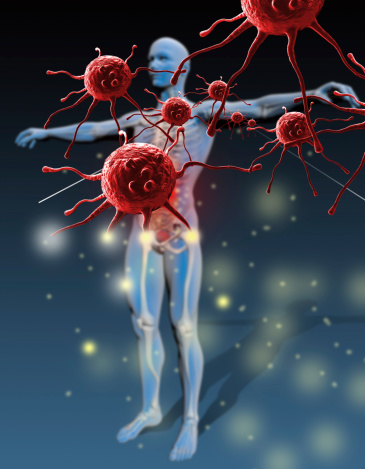 With autoimmune disorders, the goal is not to stimulate the immune system, but to regulate it. Remedies that balance immune function are known as immune-modulators or immune amphoterics. These include herbs like American ginseng (in very small doses), astragalus, black walnut, cat’s claw (una de gato) licorice root, schizandra and medicinal mushrooms like cordyceps, miatake and reishi. Mineral Chi Tonic is a good basic supplement for balancing immune reactions. As with other supplements for autoimmune conditions, start with small doses and if symptoms get worse, discontinue the supplement.
With autoimmune disorders, the goal is not to stimulate the immune system, but to regulate it. Remedies that balance immune function are known as immune-modulators or immune amphoterics. These include herbs like American ginseng (in very small doses), astragalus, black walnut, cat’s claw (una de gato) licorice root, schizandra and medicinal mushrooms like cordyceps, miatake and reishi. Mineral Chi Tonic is a good basic supplement for balancing immune reactions. As with other supplements for autoimmune conditions, start with small doses and if symptoms get worse, discontinue the supplement.
Another way to balance the immune system is to down regulate inflammatory processes. So, a person with an autoimmune condition will benefit from using foods, herbs and supplements that reduce inflammation. Start by eating more fresh vegetables and whole fruits. Specific foods that may help reduce inflammatory responses and immune reactions include dark chocolate or cocoa, fresh berries like blueberries and dark green leafy vegetables.
One should also reduce the intake of refined sugar and carbohydrates as these foods up regulate inflammatory processes. Antioxidant supplements may be helpful, but a diet high in fresh fruits and vegetables is the best way to get your antioxidants.
Vegetable oils (canola oil, soybean oil, corn oil, etc.) are high in omega-6 fatty acids, which may contribute to the excessive inflammatory responses in autoimmune disorders. These should be reduced or eliminated from the diet. It may also be beneficial to increase omega-3 essential fatty acids in the diet by eating foods like deep ocean fish and/or taking an omega-3 or fish oil supplement.
4. Support Adrenal Function
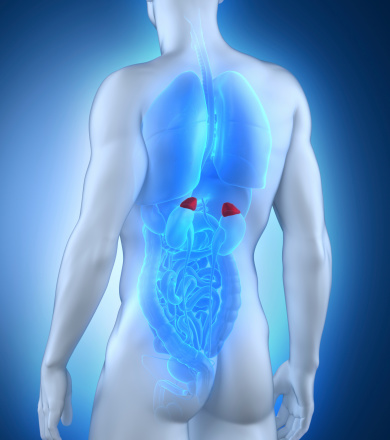 The adrenal glands produce a hormone called cortisol that reduces inflammatory responses and calms down the immune system. The corticosteroid drugs often used to treat autoimmune disorders are mimics of this hormone, which is also released from the body during stress. Chronic stress weakens the adrenal glands, which can result in cortisol levels being too low. Nearly everyone with an autoimmune disorder has exhausted adrenals, so supporting the adrenal glands and managing stress is another key therapy for these problems.
The adrenal glands produce a hormone called cortisol that reduces inflammatory responses and calms down the immune system. The corticosteroid drugs often used to treat autoimmune disorders are mimics of this hormone, which is also released from the body during stress. Chronic stress weakens the adrenal glands, which can result in cortisol levels being too low. Nearly everyone with an autoimmune disorder has exhausted adrenals, so supporting the adrenal glands and managing stress is another key therapy for these problems.
Of course, activities that promote greater relaxation and inner peace are very valuable for everyone, not just people with autoimmune disorders. These include things like prayer, meditation, journaling, getting out in nature and doing gentle exercises like yoga, tai chi or stretching. In addition to these relaxing, stress management techniques, supplements that support adrenal function can be very helpful.
Adaptagens like eleuthero root can be helpful in autoimmune disorders. So can Adrenal Support or some other adrenal glandular. If nervousness, fatigue and restless sleep are part of the symptom picture, Nervous Fatigue Formula can be helpful for balancing adrenal function, reducing stress and helping to control inflammatory responses.
There are two single herbs that can be very helpful for many people with autoimmune disorders because they act in the body to reduce inflammation in a similar manner to cortisol. One is licorice root, which has a cortisol-sparing effect that reduces inflammatory responses in the intestinal tract and other tissues. Under proper professional supervision, it can be used to help wean someone off of corticosteroid drugs. The other herb is yucca, which is excellent for any inflammatory condition involving joints and connective tissue. Although the mechanism of action is not fully understood, clinical experience suggests that it acts in a cortisol-like manner to reduce inflammation and promote healing.
5. Be Kind to Yourself
I believe that our mental and emotional state is a part of all chronic illnesses. When assessing this, I look at what is happening in the body as a clue to what is happening in the person's consciousness. The fact that the body's immune system is attacking the body's own tissues suggests to me that people with autoimmune disorders may be having problems with self love. I find that they are often too hard on themselves, too self-critical and judge themselves too harshly.
The seat of the ability to distinguish what is self from what is not self lies in the thymus gland, which lies over the heart in the center of the chest. It is the place we point to when we say "me," and the place we point to on others when we say, "you." In my emotional healing work I find this to be the center of self-esteem. Our self esteem is how we view ourselves and is based in what we put after the words, "I am..."
In our society, people tend to belittle and criticize others. As a result, we may be told that we’re not fast enough, strong enough, smart enough, thin enough, rich enough and good enough. We may incorporate these judgments of others into our self-esteem and start thinking, "I am NOT smart, good, etc." This becomes a form of self-attack and may be the psychological component of autoimmune diseases.
So, my final suggestion for people suffering from autoimmune diseases is to examine their self-talk. Get a piece of paper and write at the top, "I am..." Then proceed to fill in the paper with all the things you put after these words in your mental self-talk. Be honest with yourself. Notice the areas in which you are harsh and critical of who you are and start working on reversing these negative beliefs. If you believe "I'm stupid," then start affirming, "I'm smart." If you believe you're weak, then affirm, "I am strong." At first your psyche will resist this because you have a great deal invested in your self image, but if you persist, you'll start to build mental and emotional momentum in a new direction.
Meanwhile, pratice being gentle and kind to yourself. Do things that are pleasurable and fun for you on a regular basis, preferrably daily. Reduce your stress and learn to shift your consciousness through meditation, prayer, journaling, and perhaps counseling or emotional healing work. The flower essences I designed for NSP, Find Strength and Be Couragous, may also be helpful.
What works will be slightly different for each individual, but autoimmune diseases are best approached by focusing on an overall program of health improvement that includes working on the mental and emotional level. As toxins are eliminated, the health of the GI tract is improved, inflammation and stress are reduced and self esteem is improved the immune system will do a better job of identifying who is “friend” and who is “foe.” It takes some persistent and patient effort, but it can be done.

-web.jpeg)